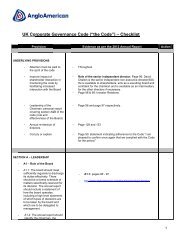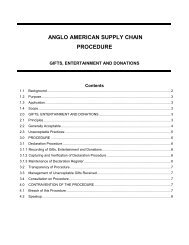pdf [ 1.9MB ] - Anglo American
pdf [ 1.9MB ] - Anglo American
pdf [ 1.9MB ] - Anglo American
Create successful ePaper yourself
Turn your PDF publications into a flip-book with our unique Google optimized e-Paper software.
01<br />
02<br />
CONTENTS<br />
INTRODUCTION<br />
02 Introduction: <strong>Anglo</strong> <strong>American</strong> - a partner of choice - Kuseni Dlamini<br />
03 Mission and Trustees<br />
04 Foreword: Saluting South Africa’s champions - Clem Sunter<br />
05 Financial and governance report<br />
06 <strong>Anglo</strong> <strong>American</strong> Chairman’s Fund – at a glance<br />
FOCUS AREAS<br />
09 - Education<br />
12 - HIV/Aids<br />
14 - Welfare<br />
16 - Healthcare<br />
18 - Entrepreneurial development<br />
20 - Arts and culture<br />
23 - Environment<br />
25 - Policy, advocacy and research<br />
27 - Projects supported in 2007<br />
<strong>Anglo</strong> <strong>American</strong> - a partner of choice<br />
<strong>Anglo</strong> <strong>American</strong> seeks to make a positive and sustainable<br />
contribution to the people and communities in which we operate<br />
and beyond. This includes creating an enduring positive legacy<br />
in terms of the environment, as well as the economic and<br />
social well-being of the people, communities and countries in<br />
which we operate.<br />
To achieve our objective of becoming the leading global<br />
mining company, we are focusing on entrenching the ‘One<br />
<strong>Anglo</strong>’ culture across all our operations. It is our aim to<br />
bring all our people and operations together as ‘One <strong>Anglo</strong>’<br />
with a strong, performance-oriented culture. Our corporate<br />
culture of ‘people making a difference in a company making a<br />
difference’ is driven by the imperative of achieving excellence<br />
in everything we do, and on the understanding that as ‘one’<br />
we are greater than the sum of the parts.<br />
Similarly, in overcoming South Africa’s developmental<br />
challenges we need to pull together as a corporation, as<br />
a country and as responsible corporate global citizens.<br />
Accordingly, our corporate social investment (CSI) programme<br />
is aligned with national development priorities such as<br />
AsgiSA, JIPSA, poverty alleviation, social development as<br />
well as broader initiatives including the United Nations’<br />
Millennium Development Goals.<br />
As the largest private sector investor in South Africa, we<br />
produce some 2% to 2.25% of South Africa’s GDP – making<br />
a significant contribution to the economy of the country. In<br />
2007, we contributed R11 billion in taxes alone to the South<br />
African economy and since the listing of <strong>Anglo</strong> <strong>American</strong> plc<br />
in 1999, we have invested R158 billion (or R197 billion in<br />
2007 terms) in the country.<br />
However, our contribution to South Africa goes far beyond<br />
increasing shareholder value. <strong>Anglo</strong> <strong>American</strong> South Africa<br />
contributes to the broader, long-term developmental needs<br />
of the country through a focused CSI programme. The total<br />
<strong>Anglo</strong> <strong>American</strong> South Africa spend on CSI in 2007 was<br />
R288.5 million, with R69 million channelled through the<br />
<strong>Anglo</strong> <strong>American</strong> Chairman’s Fund.<br />
One of <strong>Anglo</strong> <strong>American</strong>’s guiding values is accountability.<br />
This involves having a can-do attitude, high performance<br />
expectations and a bias for action, as well as going beyond<br />
the immediate responsibilities of one’s given role. The <strong>Anglo</strong><br />
<strong>American</strong> Chairman’s Fund has built up an established track<br />
record by displaying each of these attributes and I would<br />
therefore like to pay tribute to our Chairman’s Fund, which<br />
for so long has been the acknowledged leader in the field of<br />
corporate social investment in South Africa.<br />
The Fund offers support to a wide range of non-profit<br />
organisations across many areas, making a difference to<br />
communities throughout South Africa. An independent<br />
fund with its own Board of Trustees, the Chairman’s Fund is<br />
driven by the company’s<br />
broad imperatives, and is<br />
managed by Tshikululu<br />
Social Investments.<br />
The Fund’s two largest<br />
contributions are in the<br />
sectors of education and<br />
HIV/Aids, arguably the<br />
two biggest areas of<br />
challenge and opportunity<br />
for improvement in South<br />
Africa.<br />
It takes sustained<br />
intervention over an<br />
extended period of time<br />
to create an environment in which ordinary people are able to<br />
assume greater control of their lives. Accordingly, the Fund is<br />
committed to providing long-term support to its beneficiaries,<br />
with a focus on establishing socio-economic independence.<br />
This has led to the formation of valuable relationships<br />
with many organisations. Over time and through these<br />
relationships, the Fund has built up a wealth of combined<br />
knowledge and experience, establishing a base of valuable<br />
lessons learned, which can be applied to other interventions<br />
in similar fields with different partners.<br />
This partnership approach underpins <strong>Anglo</strong> <strong>American</strong> South<br />
Africa’s interaction with all our stakeholders and it is an<br />
approach we will build on going forward. We will continue<br />
to invest in social development programmes which create<br />
sustainable solutions, thereby promoting social cohesion,<br />
shared value systems, and national unity. With an approved<br />
project pipeline of R108 billion, of which just over R38 billion<br />
(35%) is in South Africa, we will also continue to make a<br />
significant contribution to the economic development of the<br />
country.<br />
In closing, I would like to give praise and acknowledge all<br />
those who are involved in making the Chairman’s Fund the<br />
outstanding organisation it is. The Fund has received many<br />
external accolades. While recognition and validation of this<br />
nature are encouraging and valuable, such is the calibre and<br />
commitment of the people who work for the Fund, that I know<br />
they will get even more reward from the quiet satisfaction<br />
created by the knowledge that they are making a difference<br />
to the lives of people and communities throughout South<br />
Africa.<br />
Kuseni Dlamini<br />
Head of <strong>Anglo</strong> <strong>American</strong> South Africa<br />
<strong>Anglo</strong> <strong>American</strong> Chairman’s Fund Review 2007 <strong>Anglo</strong> <strong>American</strong> Chairman’s Fund Review 2007
03<br />
04<br />
OUR MISSION<br />
To be the leading corporate donor in South Africa based on an informed understanding of the country’s<br />
developmental challenges and by maximising our resources to support and add value to practical<br />
interventions, simultaneously addressing urgent social needs and creating new opportunities.<br />
FOREWORD<br />
Saluting South Africa’s champions<br />
The Impilo Health<br />
Programme, part of<br />
the Metropolitan<br />
Evangelical Services,<br />
delivers a professional<br />
and holistic healthcare<br />
service to the<br />
homeless and destitute<br />
community within<br />
the inner city of<br />
Johannesburg.<br />
Positive change is<br />
not possible without<br />
champions. Such<br />
champions are to be<br />
found in all corners<br />
of our country – in<br />
townships, in suburbs,<br />
in informal settlements,<br />
in deep rural areas, and<br />
often just next door.<br />
These are the people who have looked at the challenges<br />
around them and undaunted, have tackled those challenges<br />
with vigour. Very often these people could easily have<br />
found places in our formal economic sectors, with all the<br />
attendant financial rewards. Instead, they have chosen<br />
another route in life.<br />
The <strong>Anglo</strong> <strong>American</strong> Chairman’s Fund seeks out these<br />
community champions, and we are constantly astonished<br />
and humbled by what they achieve. We are deeply<br />
privileged to be able to play a small part by partnering<br />
with them and providing some support.<br />
We have dedicated the 2007 Review to the many<br />
champions we have backed, highlighting just some<br />
of them. Although we are not able to include all our<br />
champions in this publication, we trust that this overview<br />
will give readers some measure of insight into the selfless<br />
work going on around us in our immediate communities<br />
and throughout South Africa.<br />
Our sincerest thanks to each of these people, who,<br />
although they consider themselves ordinary, have achieved<br />
extraordinary results. <strong>Anglo</strong> <strong>American</strong> salutes you all.<br />
Our trustees<br />
Mr Clem Sunter (Chairman)<br />
Mr Dave Barber<br />
Ms Delisiwe Dludlu (until October 2007)<br />
Mr Godfrey Gomwe<br />
Ms Margie Keeton<br />
Mr Modupi William Leshilo (left during 2007)<br />
Mr Saleh Mayet<br />
Mr Norman Mbazima<br />
Ms Yvonne Mfolo<br />
Ms Mary Jane Morifi<br />
Mr Daniel Ngwepe<br />
Dr Pranill Ramchander<br />
Ms Dineo Ramokgopa<br />
Mrs Viv Schreiner (until July 2007)<br />
Mr Isaac Shongwe (until mid-December 2007)<br />
Mr Michael Spicer<br />
Mr Abe Thebyane (until July 2007)<br />
Mr Pumlani Tyali (until July 2007)<br />
They have chosen to create opportunities for others.<br />
They have made a profound, lasting impact on the lives<br />
of thousands of people, often by extending care and<br />
compassion to the most vulnerable of their fellow citizens.<br />
These champions have led by the power of example,<br />
inspiring others to rise to the challenge of improving the<br />
lives of the disadvantaged.<br />
Clem Sunter<br />
Chairman,<br />
<strong>Anglo</strong> <strong>American</strong> Chairman’s Fund<br />
Leratong Hospice<br />
<strong>Anglo</strong> <strong>American</strong> Chairman’s Fund Review 2007 <strong>Anglo</strong> <strong>American</strong> Chairman’s Fund Review 2007
05<br />
06<br />
FINANCIAL AND GOVERNANCE REPORT<br />
ANGLO AMERICAN CHAIRMAN’S FUND – AT A GLANCE<br />
Financial report<br />
In 2007, grants totalled R68,718,267 million. Education<br />
remained the largest area of involvement for the<br />
Chairman’s Fund, followed by funding in the HIV/Aids and<br />
Welfare and Development sectors.<br />
Governance<br />
The Chairman’s Fund is governed by a Board of Trustees<br />
that meets quarterly to determine the Fund’s strategy<br />
and policies, as well as approve grants (above R80,000)<br />
and special projects. The Chairman’s Fund is managed by<br />
Tshikululu Social Investments (Tshikululu), a Section 21<br />
‘Not for Gain’ company, which was formed in 1998 to<br />
manage the Chairman’s Fund and other ‘sister’ Funds.<br />
A specialist corporate social responsibility management<br />
organisation, Tshikululu assists the Chairman’s Fund in<br />
a variety of areas including strategic planning and policy<br />
reviews; project initiation, evaluation and monitoring; grant<br />
making; programme management and value engineering;<br />
financial control; reporting and governance; legal and tax<br />
issues; as well as accountability and liaison.<br />
In addition, a special projects team at Tshikululu advises<br />
the Chairman’s Fund on infrastructural and capital projects.<br />
This specialised team provides expertise in engineering,<br />
architecture and construction. It forms project steering<br />
committees with the Fund and partner representatives,<br />
conducting regular on-site visits and managing the overall<br />
capital projects process.<br />
“The aims of this Group have been – and will remain – to earn profits but to<br />
earn them in such a way as to make a real and permanent contribution to the<br />
well-being of the people and to the development of southern Africa.”<br />
Sir Ernest Oppenheimer, 1954<br />
Sectoral Giving by Value<br />
Provincial<br />
2 1<br />
4<br />
Giving by Value<br />
4 1<br />
5<br />
5<br />
18<br />
46<br />
9<br />
11<br />
7<br />
28<br />
City Year service leader teaching learners leadership skills at Lekang School, Gauteng.<br />
19<br />
Sector Amounts %<br />
Education R 31,988,530 46%<br />
HIV/Aids R 13,304,793 19%<br />
Welfare and Development R 12,119,474 18%<br />
Health R 3,352,800 5%<br />
Arts and Culture R 3,202,015 5%<br />
Entrepreneur Development R 2,636,000 4%<br />
Environment R 1,304,655 2%<br />
Policy and Advocacy R 810,000 1%<br />
Total R 68,718,267 100%<br />
11 17<br />
12<br />
Sector Amounts %<br />
Gauteng R 19,213,324 28%<br />
Limpopo R 11,361,217 17%<br />
KwaZulu-Natal R 7,941,251 12%<br />
National R 7,668,801 11%<br />
Western Cape R 7,402,943 11%<br />
Mpumalanga R 6,350,119 9%<br />
Eastern Cape R 4,832,000 7%<br />
North West R 3,040,107 4%<br />
Northern Cape R 698,505 1%<br />
Free State R 180,000 0%<br />
Outside SA R 30,000 0%<br />
Total R 68,718,267 100%<br />
The early days<br />
Investment in people and community development has long<br />
been recognised by <strong>Anglo</strong> <strong>American</strong> as part of its wider role<br />
in society. A chairman’s fund was started in the 1950s and<br />
in 1974 Sir Ernest Oppenheimer’s son, Harry, formalised the<br />
<strong>Anglo</strong> <strong>American</strong> and De Beers Chairman’s Fund to contribute<br />
to community development and social change in a more<br />
focused, structured and purposeful way. The Chairman’s<br />
Fund thus emerged as the first professionally managed<br />
corporate social investment fund in South Africa.<br />
Supporting disadvantaged South<br />
Africans<br />
Throughout the turbulent years of the 1970s, 1980s and<br />
early 1990s, <strong>Anglo</strong> <strong>American</strong> took the lead in engaging<br />
in community development work and acting to support<br />
South Africans disadvantaged by state policy. Through the<br />
Chairman’s Fund, <strong>Anglo</strong> <strong>American</strong> became South Africa’s<br />
largest corporate social investor, and the largest private<br />
sector contributor to public schooling for disadvantaged<br />
South Africans.<br />
Continuing into the new South<br />
Africa<br />
In 1998, the <strong>Anglo</strong> <strong>American</strong> Group was restructured into<br />
three separate entities: <strong>Anglo</strong>Gold, De Beers and <strong>Anglo</strong><br />
<strong>American</strong>. This led to the establishment of the <strong>Anglo</strong><br />
<strong>American</strong> Chairman’s Fund in its current form.<br />
Today, <strong>Anglo</strong> <strong>American</strong> is still South Africa’s largest<br />
supporter of corporate social investment (CSI), working<br />
closely with the democratically elected government to<br />
create a better future for all.<br />
<strong>Anglo</strong> <strong>American</strong> Chairman’s Fund Review 2007<br />
<strong>Anglo</strong> <strong>American</strong> Chairman’s Fund Review 2007
07<br />
08<br />
Interactive Themba Theatre City Year leaders Stellenbosch University SciMathUS<br />
Our achievements<br />
In 2007, the Chairman’s Fund continued to receive<br />
accolades. These included:<br />
• Voted by NGOs as South Africa’s Best Corporate<br />
Grantmaker for the seventh consecutive year in<br />
Trialogue’s CSI Handbook survey<br />
• Of the 27 categories in the 2007 Trialogue survey, the<br />
Chairman’s Fund received 14 first places, one second<br />
place and three third places<br />
• A special award was presented by Trialogue to the Fund<br />
winning the category of Best Corporate Grantmaker the<br />
Our mandate<br />
The <strong>Anglo</strong> <strong>American</strong> Chairman’s Fund is a dedicated<br />
instrument through which the <strong>Anglo</strong> <strong>American</strong> Group<br />
companies channel their social investment spend in<br />
South Africa. The broad mandate of the Fund is to support<br />
development initiatives aimed at transforming the lives of<br />
South Africa’s disadvantaged communities. The Fund is<br />
committed to creating an environment in which ordinary<br />
people are given a ‘hand-up’ rather than a ‘hand-out’,<br />
thereby helping them to assume greater control of their<br />
lives.<br />
South Africa’s social development needs cut across a<br />
wide range of geographical areas and communities. In<br />
order to meet the challenge of these complex needs and<br />
to bring about real change in the lives of people from<br />
all walks of life, the <strong>Anglo</strong> <strong>American</strong> Chairman’s Fund<br />
has adopted a holistic, far-reaching approach that goes<br />
beyond the parameters of <strong>Anglo</strong> <strong>American</strong>’s business<br />
interests to focus on the country’s broader, long-term<br />
developmental needs.<br />
most times since the inception of the Trialogue survey<br />
10 years ago<br />
• The Limpopo Rural Schools Programme won the Investing<br />
in Education category of the Mail & Guardian’s Investing<br />
in the Future awards<br />
• Two partner organisations of the Chairman’s Fund,<br />
Themba Interactive Theatre and the Coalition of Anglican<br />
Children’s Homes, were also honoured in the Investing<br />
in the Future awards for their community work.<br />
“I want to extend my sincere congratulations to you on this fantastic<br />
achievement. Clearly, this represents a world-class organisation and approach.<br />
It is also remarkable that you are able to continue to raise performance<br />
standards year on year.”<br />
Cynthia Carroll – CEO, <strong>Anglo</strong> <strong>American</strong> plc<br />
bringing new hope and opportunity to South Africa’s<br />
disadvantaged communities, drawing upon our extensive<br />
experience within the social investment arena.<br />
The Fund is committed to making effective and sustainable<br />
use of limited resources to create an environment in which<br />
ordinary people assume greater control of their lives.<br />
Our philosophy<br />
Formally established in 1974, the Chairman’s Fund was the<br />
first professionally managed corporate social investment<br />
fund in South Africa. The Fund’s projects range from<br />
small-scale, grassroots initiatives to major capital building<br />
projects and large-scale service-delivery programmes. A<br />
portion of the funds available is focused on strategic and<br />
geographic areas of significance to the <strong>Anglo</strong> <strong>American</strong><br />
group of companies in South Africa. However, in order<br />
to be fully inclusive, best practice organisations will be<br />
supported wherever they are geographically situated.<br />
This strategy allows the Fund to reach out in support to<br />
projects that are really making a difference, whether big<br />
or small, in communities across South Africa.<br />
Our partnership approach<br />
The Fund actively seeks to partner and build relationships<br />
with beneficiaries, fellow donor organisations, government<br />
and state departments, ultimately assisting in collective<br />
interventions that are capable of achieving much more<br />
than individual, uncoordinated inputs. Many of these<br />
partnerships take direction from the national development<br />
imperatives identified in government’s Accelerated and<br />
Shared Growth Initiative for South Africa (AsgiSA) and<br />
the Joint Initiative on Priority Skills Acquisition (JIPSA), as<br />
well as the Millennium Development Goals set out by the<br />
United Nations.<br />
Against this backdrop, most interventions with government<br />
and state departments are in support of projects or<br />
programmes in the education and HIV/Aids sectors. By<br />
matching our funding with these partners, we believe we<br />
are making our rands ‘work twice’, building sustainable<br />
relationships and increasing the scope and efficacy of the<br />
targeted projects.<br />
The Fund is characterised by flexibility and preparedness<br />
to learn by listening to the needs of organisations and<br />
individuals. We have worked hard to help create a broader<br />
environment in which non-governmental organisations in<br />
all sectors have flourished and been able to provide vital<br />
services to development. In so doing, we have been an<br />
important catalyst for social development in South Africa<br />
and will build on this role, in the years ahead.<br />
Our focus<br />
The Fund’s most distinguishing feature is added value<br />
derived from experience and expertise accumulated<br />
over many years through countless engagements with<br />
community-based initiatives – from guiding, advising<br />
and providing networking opportunities for organisations,<br />
to the formation of major public-private partnership<br />
initiatives.<br />
Education is the largest area of involvement for the<br />
Chairman’s Fund, with 46% of spend allocated to this<br />
sector in 2007. This is followed by HIV/Aids, welfare,<br />
health, arts and culture, entrepreneurial development,<br />
environment, policy, advocacy and research.<br />
Against the backdrop of this inclusive vision, the Fund’s<br />
mandate is to support development initiatives aimed at<br />
<strong>Anglo</strong> <strong>American</strong> Chairman’s Fund Review 2007<br />
African Children’s Feeding Scheme with some of the women at the<br />
Zola Centre in Soweto.<br />
Maphotle Primary School forms part of the Rural Schools Programme, a public private partnership between the <strong>Anglo</strong> <strong>American</strong> Chairman’s<br />
Fund and the Limpopo Department of Education.<br />
<strong>Anglo</strong> <strong>American</strong> Chairman’s Fund Review 2007
09<br />
EDUCATION<br />
The Fund is committed to improving the quality of, and<br />
access to, education for all South Africans. Initiatives in<br />
the education sector include:<br />
• The provision of infrastructure and equipment for<br />
educational institutions<br />
• Mathematics and science projects to improve the quality<br />
of teaching at schools<br />
• Support for organisations catering for learners with<br />
special education needs<br />
• Tertiary academic interventions that target students<br />
from previously disadvantaged backgrounds and focus<br />
on the promotion of international education<br />
• Capacity-building programmes that promote improved<br />
teaching and learning, school management and<br />
governance.<br />
The Fund supports programmes in both formal and<br />
informal education settings, but is mindful of national<br />
and provincial education departments’ priorities. Against<br />
this backdrop, the Fund has longstanding agreements and<br />
partnerships with education departments regarding the<br />
delivery of teaching and learning, as well as the provision<br />
of buildings and other infrastructure.<br />
Limpopo Rural Schools Programme<br />
In 2003, the <strong>Anglo</strong> <strong>American</strong> Chairman’s Fund and the<br />
Limpopo Department of Education established a public<br />
private partnership focused on uplifting 16 rural schools in<br />
the Magakala and Apel areas, as well as the Sekhukhune<br />
district.<br />
The partnership initially focused on building basic classroom<br />
infrastructures and also providing water and<br />
sanitation to primary and secondary schools. Three years<br />
later, the partnership culminated in the provision of<br />
comprehensive administration, technology and laboratory<br />
facilities to the best performing maths and science<br />
schools in the programme. Spurred on by this success,<br />
the partnership expanded its range of influence, this time<br />
to the former Venda ‘homeland’ areas of Limpopo.<br />
10<br />
With the benefit of experience, the Rural Schools<br />
Programme has been able to identify particularly deserving<br />
schools like Mbilwi Secondary School, which epitomises<br />
a true spirit of championship – that of succeeding against<br />
all odds. The success of the school is evidenced by the<br />
fact that it recently produced one of the highest pass<br />
rates in the country for Senior Certificate higher grade<br />
mathematics – an exceptional achievement that is due, in<br />
no small part, to the school’s dedicated staff.<br />
“It used to be a disaster… the old classrooms were blown over<br />
by the wind… In the past children came with negative attitudes because<br />
the building was not attractive. But now, the children are happy…<br />
now they come to school with enthusiasm.”<br />
Julian Nkhone – Principal, Maphotle Primary School<br />
Alexandra Education Committee<br />
The Alexandra Education Committee was founded in<br />
2000 to raise funds to provide bursaries for academically<br />
talented children from the impoverished suburb of<br />
Alexandra in Johannesburg, giving them the opportunity<br />
to complete their secondary schooling at well-resourced,<br />
functional schools in other suburbs. The committee<br />
provides ongoing mentoring and support to all bursary<br />
holders, and has grown from a small voluntary organisation<br />
to a substantial institution with full-time staff. The <strong>Anglo</strong><br />
<strong>American</strong> Chairman’s Fund has contributed towards the<br />
costs of a director as well towards the organisation’s core<br />
costs.<br />
The Alexandra Education Committee not only provides bursaries for learners, but facilitates supplementary tuition.<br />
<strong>Anglo</strong> <strong>American</strong> Chairman’s Fund Review 2007<br />
<strong>Anglo</strong> <strong>American</strong> Chairman’s Fund Review 2007
11<br />
12<br />
Drakensberg Boys’ Choir<br />
School<br />
HIV/AIDS<br />
The Drakensberg Boys’ Choir School is the only choir<br />
school in Africa, providing tuition and training to boys<br />
with exceptional vocal talent between the ages of nine<br />
and 15. Since its inception in 1967, the choir has toured<br />
locally and internationally and has become a national<br />
asset, with the diversity of its repertoire reflecting the<br />
multicultural nature of the school and of our country. The<br />
Chairman’s Fund is involved in a substantial upgrade of<br />
accommodation facilities at the school.<br />
Partnership is essential in changing the shape and scope of<br />
the HIV/Aids pandemic. The <strong>Anglo</strong> <strong>American</strong> Chairman’s<br />
Fund has established partnerships with organisations that<br />
pioneer innovative models of support for people living with<br />
Aids and care for orphans. These models, which focus on<br />
building on existing capacity within communities, include:<br />
• Home-based care programmes<br />
• Training of community care workers<br />
• Palliative care training for nurses<br />
• Voluntary counselling and testing and antiretroviral<br />
treatment initiatives<br />
• Income-generating projects for people living with<br />
HIV/Aids<br />
• Projects supporting and caring for Aids orphans.<br />
Stellenbosch University<br />
SciMathUS<br />
“SciMathUS is more than an<br />
ordinary bridging or extended<br />
programme. It is an institution<br />
where people’s lives are changed in<br />
a significant way.”<br />
Anneke Muller – student<br />
Launched by Stellenbosch University in 2001, the<br />
SciMathUS Post-Matric Programme aims to address<br />
the situation of too few black people entering tertiary<br />
education for training in natural and applied natural<br />
sciences, as well as economic and management sciences.<br />
Less than 60% of Senior Certificate candidates attempt to<br />
do mathematics, while less than 10% of Senior Certificate<br />
candidates attempt higher grade mathematics.<br />
The programme is managed by the Institute for<br />
Mathematics and Science Training of the Curriculum<br />
Studies Department of the University of Stellenbosch, and<br />
creates an opportunity for about 75 students a year from<br />
disadvantaged backgrounds to gain entry into university,<br />
following a year of intensive tuition in mathematics,<br />
physical science and accounting.<br />
Besides academic tuition, students receive lifeskills<br />
training and the practical support required to enter<br />
university. After the students qualify for mainstream<br />
higher education, many of them act as mentors for new<br />
students – a testimony to the programme’s success and<br />
its inspirational leadership. The Chairman’s Fund has<br />
supported the project since its inception and funds a<br />
percentage of its running costs.<br />
Training and Resources for<br />
Early Education (TREE)<br />
South Coast Hospice Association<br />
TREE was the winner of the resource and training<br />
organisations category in the 2007 Absa and Sowetan<br />
Early Child Development Awards.<br />
Stellenbosch University SciMathUS<br />
Based in KwaZulu-Natal, TREE was established in 1984<br />
to address the needs of disadvantaged preschool children<br />
unable to access quality early childhood education. The<br />
organisation provides Early Childhood Development (ECD)<br />
training to unemployed women throughout the province<br />
and parts of the neighbouring Eastern Cape.<br />
TREE trains approximately 3,000 women annually in<br />
disadvantaged communities to become ECD facilitators.<br />
This not only improves the educational potential of<br />
approximately 80,000 children annually, but also impacts<br />
on women’s empowerment and community development.<br />
The South Coast Hospice Association (SCHA) in KwaZulu-<br />
Natal offers specialised palliative care in the Ugu district<br />
for patients with severe, progressive diseases, as well as<br />
their families. The goal, as with all palliative care, is to<br />
prevent and relieve suffering and to improve quality of<br />
life. Care is given in the patient’s own home, backed by<br />
an inpatient unit and local health facilities. Initially started<br />
as a cancer care centre, the SCHA has increased its focus<br />
on HIV care.<br />
In the past year, almost 1,000 patients were cared for<br />
through the integrated community-based home care<br />
programme. In addition to inpatient and home-based care,<br />
the SCHA offers education and training in HIV prevention,<br />
as well as training in counselling skills and home-based<br />
care, and foster care placement. The Fund has backed the<br />
SCHA for more than a decade.<br />
<strong>Anglo</strong> <strong>American</strong> Chairman’s Fund Review 2007<br />
<strong>Anglo</strong> <strong>American</strong> Chairman’s Fund Review 2007
13<br />
WELFARE<br />
14<br />
In addition to world-class research, Aurum manages the <strong>Anglo</strong> <strong>American</strong> Employee ART Programme and conducts HIV/Aids testing, treatment and<br />
counselling at several clinics.<br />
Aurum Institute for Health<br />
Research<br />
The Aurum Institute for Health Research is an<br />
internationally recognised, independent medical scientific<br />
organisation which focuses on research into major health<br />
issues, particularly HIV/Aids, tuberculosis (TB) and<br />
occupational diseases.<br />
Programmes and services include HIV prevention, HIV care<br />
(Aurum has received world acclaim for its management of<br />
ART programmes) and the Thibela TB research programme –<br />
part of a global research programme aimed at reducing<br />
the incidence of TB among mine workers, as well as<br />
occupational health. The Fund has made a substantial<br />
contribution towards this research centre of excellence’s<br />
operating costs.<br />
Bhubesi Monitoring Project<br />
The University of the Witwatersrand Rural Public Health<br />
and Health Transitions Unit is a key roleplayer in the<br />
Bhubesi Monitoring Project, based in a rural part of<br />
Limpopo Province. The project involves monitoring a major<br />
healthcare delivery initiative to a large rural community.<br />
<strong>Anglo</strong> Coal contributed financially to the capital costs<br />
of building a private healthcare centre, and the Fund<br />
contributed funding towards the programme’s evaluation<br />
on the effectiveness and impact of primary HIV/Aids and<br />
TB care. This project will serve as a model for rural care<br />
in South Africa that integrates and coordinates the efforts<br />
of the private and public sectors.<br />
Themba Interactive Theatre<br />
“We are able to achieve our<br />
objective of using interactive<br />
theatre to educate the youth about<br />
HIV, safer sex, relationships and<br />
behaviour change. As evidenced<br />
in research, our performances<br />
are having an impact on young<br />
people’s lives.”<br />
Eric Richardson – Managing Director,<br />
Themba HIV/Aids Organisation<br />
The Themba Interactive Theatre, part of the Themba<br />
HIV/Aids Organisation, grew out of the Trevor Huddleston<br />
CR Memorial Centre in Sophiatown, Johannesburg. The<br />
interactive performances encourage dialogue around issues<br />
of sex and HIV/Aids and also help influence behaviour to<br />
prevent the spread of HIV. The project has a number of<br />
plays that tour various schools, driving home the ‘protect<br />
yourself’ message and touching the lives of thousands of<br />
children through vibrant and realistic performances.<br />
Welfare that makes a positive difference is based on the<br />
compassion and commitment of organisations and people.<br />
The <strong>Anglo</strong> <strong>American</strong> Chairman’s Fund is a substantial<br />
funder of a broad range of welfare projects. Champions in<br />
this sector include:<br />
• Organisations and projects providing care for the elderly,<br />
the disabled, and children<br />
African Children’s Feeding Scheme<br />
“At the end of the day we feel<br />
fulfilled – you feel happy that<br />
a number of needy people are<br />
fulfilled and you make a drop in<br />
the ocean – and there won’t be an<br />
ocean without those drops we are<br />
making.”<br />
Phindile Hlalele – ACFS Secretary<br />
The African Children’s Feeding Scheme (ACFS) was<br />
founded by well-known anti-apartheid activist, Father<br />
Trevor Huddleston, in 1945. Today, the ACFS distributes<br />
food to 21, 000 children daily in the Gauteng townships of<br />
Alexandra, Tembisa, Katlehong, KwaThema and Soweto.<br />
Volunteers identify malnourished children through visits<br />
to primary schools, while others are referred to the ACFS<br />
by clinics or identified through random house visits by the<br />
organisation’s 350 active members.<br />
In addition to 13 feeding centres, three Malnutrition<br />
Rehabilitation Centres - each housing 50 children - care<br />
for the most extreme cases of child malnutrition. Of the<br />
latter, 75% are either living with, or have been orphaned<br />
by, HIV/Aids.<br />
The ACFS also offers an ‘empowerment’ scheme largely for<br />
women, who are responsible for children being fed. This<br />
scheme consists of training in food gardening, sewing,<br />
knitting, crocheting, weaving, cooking and baking.<br />
For more than 30 years <strong>Anglo</strong> <strong>American</strong> has supported the<br />
ACFS to provide food and empowerment to the children<br />
and women in Gauteng.<br />
• Initiatives aimed at improving the quality of life of the<br />
poverty-stricken and destitute<br />
• Institutions providing care, skills training and<br />
reintegration into society of vulnerable children and<br />
youth-at-risk.<br />
<strong>Anglo</strong> <strong>American</strong> Chairman’s Fund Review 2007<br />
<strong>Anglo</strong> <strong>American</strong> Chairman’s Fund Review 2007
15<br />
16<br />
LifeLine North West – Rustenburg<br />
“Directors speak of the<br />
professionalism and generosity<br />
of the Chairman’s Fund – it is<br />
generally accepted that the Fund<br />
is one of the most pleasant donor<br />
organisations to work with.”<br />
Anne Finnegan – Executive Director,<br />
LifeLine Rustenburg<br />
HEALTHCARE<br />
The Chairman’s Fund supports passionate organisations<br />
with a record of successful accomplishments in community<br />
care, as well as those implementing new and appropriate<br />
models of primary healthcare. Initiatives in the health<br />
sector include:<br />
• Primary healthcare programmes<br />
• Training of community care workers<br />
• Healthcare awareness, training, support and projects<br />
• Organisations catering for the social and economic<br />
integration, training, support and care of disabled<br />
people.<br />
LifeLine Southern Africa provides a 24-hour crisis<br />
intervention service, available at no cost, to all members<br />
of society. LifeLine North West, based in Rustenburg, is<br />
the preferred relevant service provider for the Department<br />
of Health, and provides trained counsellors to state health<br />
facilities in the Rustenburg area.<br />
Red Cross Air Mercy Service<br />
With the Fund’s support, LifeLine North West purchased<br />
a vehicle for its mobile VCT clinic and is now able to<br />
provide a much needed service to the community.<br />
Woodside Sanctuary<br />
Partnership Foundation Trust<br />
Situated in Cottesloe, Johannesburg, Woodside Sanctuary<br />
caters for children who are profoundly mentally<br />
disabled or who suffer from multiple disabilities. The<br />
sanctuary also fosters abandoned, orphaned and abused<br />
handicapped children on behalf of the Department of Social<br />
Development. Through the ongoing work of dedicated<br />
staff, Woodside has established a place of excellence in<br />
holistic care and stimulation for the profoundly disabled.<br />
With assistance from the Fund, the sanctuary has<br />
refurbished its wellness centre and one of its wards.<br />
“Since the Chairman’s Fund visited<br />
us years ago, they took our hand<br />
and opened the field of grantmaking<br />
and sponsorships and so opened<br />
doors for our programme.”<br />
Johan van der Walt – CEO,<br />
Partnership Foundation Trust –<br />
Leaders in Action Programme<br />
The Partnership Foundation Trust (PFT) in the North West<br />
Province was founded on the premise that the leaders<br />
of tomorrow need to be inspired, guided and equipped<br />
today.<br />
Aiming straight with the Partnership Foundation Trust<br />
The PFT develops potential young leaders from all sectors<br />
of the community over a consecutive three-year period.<br />
The emphasis is on learning through experience by means<br />
of a wide variety of courses and practical assignments<br />
based on business principles, technology and adventure.<br />
Learners are placed in situations where life orientation is<br />
emphasised.<br />
The PFT has advanced the abilities of young leaders in<br />
different fields such as information technology, media<br />
and communication, research, economics, art, lifestyle,<br />
adventure, management and community leadership. The<br />
fund has for several years supported the PFT’s Leadership<br />
Programme and more recently the HIV/AIDS Respect for<br />
Life Programme.<br />
Established in 1966, the South African Red Cross Air Mercy<br />
Service (AMS) acts nationally to provide an air ambulance<br />
network, outreach and emergency rescue services. Its<br />
services are unique in that they are designed according to<br />
provincial needs, in consultation with community health<br />
workers.<br />
The AMS brings together professional people who<br />
accomplish extraordinary things by volunteering their<br />
services to improve the quality of life of people within<br />
disadvantaged communities. These services include<br />
a Flying Doctor and Rural Health Outreach service, an<br />
emergency Air Ambulance service, and Rescue services,<br />
which provides specialised support in mountain and surf<br />
rescues.<br />
In 2007, the Fund contributed towards a much-needed<br />
paediatric incubator and a multi-system ECG machine.<br />
This follows a 2006 grant for a vehicle used to extend<br />
the services of the organisation’s outreach programme in<br />
KwaZulu-Natal.<br />
<strong>Anglo</strong> <strong>American</strong> Chairman’s Fund Review 2007<br />
<strong>Anglo</strong> <strong>American</strong> Chairman’s Fund Review 2007
17<br />
Cape Mental Health<br />
ENTREPRENEURIAL DEVELOPMENT<br />
18<br />
The Chairman’s Fund supports passionate organisations<br />
that work to economic empowerment within the formal,<br />
informal and rural economic sectors. These skills training<br />
projects underpin stable, long-term individual and societal<br />
upliftment. Initiatives in this field include:<br />
• Programmes in the formal, informal and rural sectors<br />
• Skills training.<br />
The Fund salutes the champions of these initiatives,<br />
which are making a profound difference in helping people<br />
develop their full potential and to empower themselves<br />
and their communities.<br />
Cape Mental Health‘s range of psychological and social services increase their members’ independence and quality of life and reduces<br />
incidences of rehospitalisation.<br />
Cape Mental Health provides a wide spectrum of services<br />
to communities throughout the Western Cape, focusing<br />
primarily on poverty-stricken areas where gangsterism,<br />
HIV/Aids prevalence, drug abuse, child abuse and other<br />
social problems are rife. Through support from the<br />
Chairman’s Fund for the Rainbow Foundation and Fountain<br />
<strong>Anglo</strong> <strong>American</strong> Chairman’s Fund Review 2007<br />
House programmes, adults with psychiatric disabilities are<br />
rehabilitated. Other services offered by this remarkable<br />
organisation include assistance in counselling, court<br />
preparation for victims of abuse and the provision of<br />
expert witness services during trials.<br />
University of Stellenbosch Community Development<br />
Initiative<br />
“We are sure that other sponsors look at our proposals with more interest once<br />
they notice that a reputable initiative like the Chairman’s Fund is our sponsor.”<br />
Lydia Burger – Coordinator, MCS<br />
The Khanyisa Learning Project falls under MCS’s Youth Education and Development<br />
Programme and prepares secondary school learners for matriculation.<br />
Matie Community Service (MCS) was formed in 1964 when<br />
medical students at the Tygerberg campus of Stellenbosch<br />
University identified the need for basic medical services<br />
in under-resourced communities in the Cape Flats. Since<br />
then, MCS has become an integral community outreach<br />
and training programme at the university’s three campuses<br />
(Stellenbosch, Tygerberg and Saldanha). Ten full-time<br />
staff and more than 1,000 student volunteers undertake<br />
projects to uplift people in disadvantaged communities<br />
through service and skills development programmes.<br />
Over the years, funding from the Chairman’s Fund has<br />
been allocated to educational development, volunteer,<br />
business training and primary healthcare programmes.<br />
The Skills to Furnish programme forms part of the Othandweni (Metropolitan Evangelical Services) project.<br />
Othandweni (Metropolitan Evangelical Services)<br />
“The Fund is very professional,<br />
strong administratively and has<br />
always assisted us promptly.”<br />
Leona Pienaar – Marketing Manager,<br />
Metropolitan Evangelical Services<br />
Othandweni is one of seven projects run by the<br />
Metropolitan Evangelical Services (MES), a mission<br />
organisation in the inner city of Johannesburg. Originally<br />
established as a feeding scheme, Othandweni has since<br />
1995 operated as a welfare organisation with several<br />
areas of focus – basic care and human rights, sport and<br />
recreation, and entrepreneurial training.<br />
Street children are a particular area of focus. Othandweni<br />
works in partnership with other organisations and<br />
institutions to empower street children and help them to<br />
become productive members of society. Othandweni also<br />
houses about 300 street children from dysfunctional,<br />
impoverished families. The Chairman’s Fund sponsors<br />
the MES Life Skills Training Programme which teaches<br />
basic business skills to members of the community.<br />
<strong>Anglo</strong> <strong>American</strong> Chairman’s Fund Review 2007
19<br />
ARTS AND CULTURE<br />
20<br />
Phumani Paper has developed the methodology to produce acid-free archival paper for a niche markets - primarily museums and libraries - in<br />
South Africa.<br />
Dedeni Agriculture<br />
Phumani Paper<br />
Arts and culture represent the heart and the heritage of<br />
a nation. The Fund supports a broad range of arts and<br />
culture projects that act as skills development initiatives.<br />
Artists and administrators involved in these projects work<br />
with great energy and passion to impart knowledge and<br />
instil a love for arts and culture to as many South Africans<br />
as possible. Initiatives in this sector include:<br />
• Opening up the arts to marginalised communities<br />
• Nurturing home-grown talent and providing tuition at an<br />
international level<br />
• Highlighting, recording and preserving the cultural<br />
diversity of South Africa, national treasures and heritage<br />
of the country<br />
• Use of the arts as media for training and awareness<br />
programmes in other sectors, principally community<br />
health.<br />
The Dedeni Agriculture project is a shining example of<br />
entrepreneurial development in the agricultural sector.<br />
The Fund approved a three-year grant to help the<br />
project boost the productivity and skills of small-scale<br />
farmers in the Port St Johns area of the Eastern Cape.<br />
The Fund has played a lead role in bringing various role<br />
players together, including farmers, the Department of<br />
Agriculture, the local municipality, and various training<br />
and skills development agencies. The project, now in its<br />
second year, is making good progress with the training<br />
of farmers, the establishment of communal infrastructure<br />
including a dip tank, and the provision of small, lowinterest<br />
loans for capital costs covering items such as<br />
water pumps and fencing.<br />
Phumani Paper was started by the former Technikon<br />
Witwatersrand – now the University of Johannesburg –<br />
in 2000 with assistance from the Department of Arts,<br />
Culture, Science and Technology.<br />
Phumani Paper works with and supports 17 handmade<br />
paper producer groups in seven South African provinces.<br />
The paper crafters specialise in different agricultural<br />
plant species that are specific to their local surroundings.<br />
The Free State group, for example, produces paper from<br />
mielie husks, while in KwaZulu-Natal paper is made<br />
with sugar cane waste. Other fibres utilised in the paper<br />
production process include banana stem fibres, invasive<br />
vegetation such as Port Jackson and noxious weeds such<br />
as milkweed.<br />
Field Band Foundation<br />
“There is a 12 year-old girl who joined the field band as a dancer in eMalahleni<br />
in Witbank in 2005. She has never missed a rehearsal and is totally committed<br />
to the band. Her family has no income and circumstances are difficult. But at<br />
the band she is always smiling.”<br />
Retha Cilliers – CEO, Field Band Foundation<br />
Phumani Paper<br />
<strong>Anglo</strong> <strong>American</strong> Chairman’s Fund Review 2007<br />
In 1997, the Field Band Foundation (FBF) brought the<br />
<strong>American</strong> marching band concept to disadvantaged areas<br />
of South Africa. Through participation in band activities,<br />
young people who might otherwise have little opportunity<br />
for constructive recreational activity are taught the<br />
advantages of application, competitiveness, teamwork,<br />
discipline and timekeeping, with the attendant benefits of<br />
heightened self-esteem and self-confidence.<br />
Many of the FBF’s beneficiaries come from impoverished<br />
backgrounds. The average age of band members is 14<br />
years and 80% have not had prior musical training. While<br />
training in musical instruments, movement and dance<br />
forms the core of the FBF’s activities, band members also<br />
receive HIV and Aids peer education, general education<br />
in social development, as well as specific life skills and<br />
musical training. National FBF gatherings and competitions<br />
facilitate interaction between children from different<br />
racial, linguistic and ethnic groups.<br />
The Fund supports three bands in Witbank, Rustenburg<br />
and the Northern Cape.<br />
<strong>Anglo</strong> <strong>American</strong> Chairman’s Fund Review 2007
21<br />
22<br />
Moving into Dance Mophatong<br />
“My talents since I joined the Moving into Dance family didn’t only end at<br />
dance stages and studios… In 2005, I acted as the main character in a National<br />
Geographic Channel documentary shot by Big Banana Films. Along with my<br />
duties at MIDM, I am also an Arts and Culture teacher at Futura Primary School<br />
and I have facilitated the Pale Ya Rona Gauteng Carnival 2007 for 7,000<br />
dancers in five different regions in Gauteng.”<br />
Itumeleng Hlapane – professional dancer and teacher<br />
Cape Town Opera<br />
“Before 1994, you couldn’t find black people singing in opera in South Africa.<br />
Now opera schools are full of black people and in the high schools, there is lots<br />
of interest. It’s a matter of education.”<br />
Mthunzi Mbombela – tenor, Cape Town Opera<br />
Cape Town Opera targets talented individuals who have<br />
not had the opportunity to develop their music skills.<br />
Participants, who are drawn primarily from marginalised<br />
communities, are trained in language, stagecraft, musical<br />
literacy and vocal development. Cape Town Opera has<br />
three focus areas: productions, educational outreach<br />
projects and the Cape Town Opera Training Trust.<br />
In terms of educational outreach projects, the organisation<br />
undertakes national school tours and park concerts. As<br />
regards training and development, over 85% of singers<br />
are from disadvantaged backgrounds. Some of the<br />
graduates who have launched singing careers at home and<br />
abroad include Pauline Malefane, who starred in the Berlin<br />
Film Festival’s Golden Bear award-wining film, uCarmen<br />
eKhayelitsha, and Abel Moereng, Julliard School of Music<br />
graduate and BBC Singer of the World finalist.<br />
The Cape Town Opera Training Trust runs the Cape Town<br />
Opera Studio for young singers with voices mature enough<br />
to tackle major roles in the standard operatic repertoire,<br />
but who lack experience in operatic stagecraft. The trust<br />
also runs the Vocal Ensemble which provides training to<br />
township singers.<br />
Moving into Dance Mophatong<br />
Founded by Sylvia Glasser as a non-racial dance<br />
organisation in 1978, Moving into Dance Mophatong<br />
(MIDM) is the only organisation in South Africa that<br />
teaches Edu-dance, a teaching methodology that uses<br />
creative dance to teach subjects such as language,<br />
arithmetic and biology. An outreach programme was<br />
initiated in 1992 and operates in various schools in<br />
Gauteng.<br />
In addition, MIDM runs a one-year diploma course, the<br />
Performing Arts Training Course, for school leavers. This<br />
equips graduates to work in many fields of arts education<br />
including teaching, performance, choreography, arts<br />
administration and research. Over the past few years,<br />
MIDM has produced award-winning South African<br />
choreographers such as Vincent Sekwati Mantsoe and<br />
Gregory Vukani Maqoma. A number of its dancers have<br />
enjoyed high-profile careers as performers in shows<br />
such as The Lion King and African Footprint.<br />
<strong>Anglo</strong> <strong>American</strong> Chairman’s Fund Review 2007<br />
The Orchestra Company<br />
The Johannesburg Orchestra Company, fondly known as<br />
‘the Orchestra Company’, focuses on developing young<br />
musicians from all over the greater Johannesburg area<br />
to the point where they are able to participate in a full<br />
performing orchestra. To build the children up to this<br />
level, the Orchestra Company provides individual tuition.<br />
The organisation also ensures that children have access<br />
to musical instruments, books, music stands, percussion<br />
instruments and other equipment.<br />
The company provides a musical home to more than 450<br />
children and youth from all communities, representing 104<br />
different educational institutions and schools. Some 85%<br />
of the learners in the orchestral and individual training<br />
and development programmes are from under-served<br />
areas such as Soweto, Thokoza and Hillbrow.<br />
South African Ballet Theatre<br />
The South African Ballet Theatre (SABT) was established<br />
in 2001 after the closure of the State Theatre Ballet<br />
and is the largest professional ballet company in South<br />
Africa. The SABT has worked extensively with some of<br />
the world’s leading ballet companies, including the Royal<br />
Ballet in London, the Royal Swedish Ballet, the Danish<br />
Ballet, the National Ballet of Canada and the Paris Opera,<br />
among others.<br />
In addition to performing four professional ballets a year,<br />
the SABT offers four dance development programmes for<br />
finding and growing new talent in ballet.<br />
The company also operates an extensive teaching and<br />
outreach programme that fills the gap created by the<br />
dearth of recreational facilities in the impoverished areas<br />
of Eersterust and Alexandra. Teacher reports indicate that<br />
participants’ schoolwork has improved, as ballet keeps<br />
children off the streets. The success and sustainability of<br />
these outreach projects in townships are due to the guts,<br />
inspiration and tenacity of the SABT staff.<br />
<strong>Anglo</strong> <strong>American</strong> Chairman’s Fund Review 2007
23<br />
ENVIRONMENT<br />
24<br />
Knowledge is the key to the conservation and preservation<br />
of our environment. Accordingly, the Chairman’s Fund<br />
supports national and international environmental<br />
initiatives focused on:<br />
• Education and training<br />
• Projects with strong developmental components<br />
• Conservation and eco-tourism.<br />
The Endangered Wildlife Trust educates and trains people around issues of conservation and eco-tourism.<br />
Eco-Access<br />
“We have always appreciated the input and advice from Fund managers<br />
and the personal interest they’ve shown in our work. The Fund is one of<br />
our ‘favourite’ funders because of the interest shown in our projects and<br />
organisation.”<br />
Julie Filmer – co-founder and Executive Director, Eco-Access<br />
Endangered Wildlife Trust<br />
The Endangered Wildlife Trust (EWT) is a South Africanbased<br />
conservation organisation, founded in 1973 to<br />
conserve threatened species and ecosystems in southern<br />
Africa.<br />
The EWT currently has 18 working groups that collectively<br />
manage over 90 projects. These working groups, the<br />
operational units of the organisation, are self-managed<br />
programmes run by a dynamic network of specialists and<br />
stakeholders in areas of conservation priority.<br />
The EWT South African Crane Working Group (SACWG)<br />
ensures the harmonious coexistence of natural crane<br />
populations and people. With the Fund’s support,<br />
conservation experts like Ursula Franke (see right) are<br />
able to fulfil the SACWG’s responsibilities by conducting<br />
research into crane breeding sites and educating land<br />
owners on crane conservation.<br />
The Southern African<br />
Wildlife College<br />
Eco-Access uses the natural environment as a medium to bring disabled and non-disabled people together.<br />
Eco-Access was launched by Rob Filmer, a blind<br />
environmentalist, to address the high levels of<br />
disempowerment and segregation experienced by disabled<br />
children – those who are blind, partially sighted, deaf, hard<br />
of hearing, mobility impaired or intellectually challenged.<br />
Eco-Access’s ultimate objective is to use access to the<br />
natural environment as a medium to empower both<br />
disabled and non-disabled people, especially children.<br />
Disabled children who grow up confident and self-aware<br />
are much more likely to take full advantage of opportunities<br />
in life, from school to the workplace, as well as becoming<br />
productive members of society.<br />
The Wattled Crane is critically endangered in South Africa.<br />
Wildlife is one of South Africa’s most valuable assets,<br />
particularly in terms of tourism and job creation. The<br />
Southern African Wildlife College has been officially<br />
recognised as a Centre of Specialisation for Wildlife<br />
Training within the South African Development<br />
Community (SADC) region. The college offers courses in<br />
wildlife management, conservation and game ranging for<br />
participants from all over southern Africa and other parts<br />
of the world. The Fund contributes towards the activities<br />
and operational costs of the college.<br />
<strong>Anglo</strong> <strong>American</strong> Chairman’s Fund Review 2007<br />
<strong>Anglo</strong> <strong>American</strong> Chairman’s Fund Review 2007
25<br />
POLICY, ADVOCACY AND RESEARCH<br />
26<br />
Throughout South Africa there are many unheralded<br />
organisations and people that focus on changing the<br />
course of history for the better. They do so by contributing<br />
to national policy research and debate, and by providing<br />
principled and credible commentary on social issues and<br />
policy. Initiatives in this sector include:<br />
• Think-tanks involved in research into a broad set of<br />
issues, from education to human rights<br />
• Organisations that lobby for social reform<br />
• Initiatives that impact upon the formation of public<br />
policy.<br />
<strong>Anglo</strong> <strong>American</strong> Cosmic<br />
Dust Laboratory<br />
“David Block is to South Africa<br />
what Carl Sagan was to <strong>American</strong><br />
astronomy – his pioneering<br />
discoveries are reshaping<br />
astronomical paradigms, and<br />
his imprint on human culture is<br />
a legacy to all South Africans<br />
as you build your future in the<br />
technological 21st century.”<br />
US astronomer John Kormendy,<br />
commenting on Professor Block<br />
The Chairman’s Fund supports selected research projects,<br />
led by extraordinary people. Among these is the work of<br />
Professor David Block. Elected as a Fellow of the Royal<br />
Astronomical Society of London at the remarkable age<br />
of 19, Professor Block is held in the highest esteem in<br />
international astronomical circles. He holds an MSc in<br />
Relativistic Astrophysics and a PhD in Astronomy, and is<br />
director of the <strong>Anglo</strong> <strong>American</strong> Cosmic Dust Laboratory at<br />
the University of the Witwatersrand.<br />
He is the only South African astronomer to have had<br />
his research featured twice on the front cover of the<br />
prestigious scientific journal, Nature. The <strong>Anglo</strong> <strong>American</strong><br />
Chairman’s Fund supports Professor Block’s work and<br />
research into astronomy and cosmology.<br />
Professor David Block<br />
Centre for Development and<br />
Enterprise<br />
The Fund has a long history of support for organisations<br />
involved in the pursuit and defence of human rights,<br />
particularly the rights of children and women, and the<br />
champions of civil rights. One such organisation is the<br />
Centre for Development and Enterprise (CDE), which<br />
is involved in research and the formation of education<br />
policy. Its recommendations have been accepted by the<br />
national Education Department as part of its blueprint<br />
for addressing the standards of teaching and learning in<br />
mathematics and science.<br />
The Chairman’s Fund has made a three-year grant to CDE<br />
for its research, analysis, publications and contributions<br />
to policy debates.<br />
<strong>Anglo</strong> <strong>American</strong> Chairman’s Fund Review 2007<br />
<strong>Anglo</strong> <strong>American</strong> Chairman’s Fund Review 2007
27<br />
PROJECTS SUPPORTED IN 2007<br />
A<br />
Abalimi Bezekhaya and Cape Flats Tree Project<br />
ACFS Community Nutritional Educational and Feeding<br />
Scheme<br />
Africa Co-operative Action Trust – Southern Africa<br />
Africa Fighting Malaria<br />
African Enterprise<br />
African Institute for Mathematical Sciences<br />
African Schools Debating Championships<br />
Alexandra Educational Committee<br />
Alexsan Kopano Educational Trust<br />
Angus Gillis Foundation<br />
<strong>Anglo</strong> <strong>American</strong> Chairman’s Fund Maths and Science<br />
Award<br />
Anthony Sampson Foundation<br />
Art Therapy Centre<br />
Aurum Institute for Health Research<br />
Avril Elizabeth Home<br />
B<br />
Bel Porto Foundation<br />
Bergzicht Training Centre<br />
Bertoni Mercy Clinic – Mmakau Village<br />
Bethany Home – Little Saints of Bethany<br />
Bhubesi Monitoring Project<br />
BirdLife South Africa<br />
Business Skills and Development Centre<br />
C<br />
Camdeboo Hospice<br />
Cape Mental Health<br />
Cape Town Holocaust Centre<br />
Cape Town Opera<br />
Carel Du Toit Centre<br />
Carryou Ministry Home Based Care<br />
Casa Do Sol School<br />
Catholic Institute of Education – National Schools Office<br />
Catholic Medical Mission Board<br />
Central University of Technology Free State – Faculty of<br />
Engineering, Information and Communication<br />
Centre for Conflict Resolution<br />
Centre for Development and Enterprise<br />
Chaeli Campaign<br />
Childline Johannesburg (Gauteng) – Safe House Project<br />
Childline Johannesburg (Gauteng) – Tembisa Community<br />
Development Project<br />
Children’s Assessment and Therapy Centre<br />
Children’s Disability Centre<br />
Chris Hani Baragwanath Hospital – Comforts Committee<br />
Church and Community Facilitation Network<br />
City Year<br />
Coalition of Anglican Children’s Homes<br />
College of Magic<br />
Common Purpose South Africa<br />
Community Action Towards a Safer Environment<br />
Community Chest – Port Elizabeth/Nelson Mandela<br />
Metro<br />
Compassionate Friends<br />
Conquest for Life – Westbury Project<br />
Cotlands<br />
Crisis Line<br />
D<br />
Deaf Child Pre-School and Grades Classes<br />
Dedeni Agriculture Project<br />
Dependable Strengths Articulation Programme<br />
Diabetes South Africa<br />
Digital Links International<br />
Drakensberg Boys’ Choir School<br />
Durban Children’s Home<br />
Durban Music School<br />
E<br />
Eastern Province Child and Youth Care Centre<br />
Ebenezer Welfare, Supporting and Caring Organisation<br />
Eco-Access<br />
Educo Africa<br />
Edutak Pre-school Training and Development<br />
Ekupholeni Mental Health Centre<br />
Endangered Wildlife Trust – Steenkampsberg Plateau<br />
Enlighten Education Trust<br />
Eskom Exco for Young Scientists<br />
Ethembeni HIV/Aids Ministry – Howick Community<br />
Church<br />
F<br />
Family and Marriage Society of SA – Potchefstroom<br />
Family Health Services<br />
Faranani<br />
Feedback Food Redistribution<br />
Field Band Foundation<br />
Filadelfia Secondary School<br />
Forest Town Foundation<br />
Free State Residential Care Centre<br />
Friends of Mosvold Hospital<br />
G<br />
GADRA Education<br />
Good Samaritan Home – Cradock<br />
Grahamstown Hospice<br />
Greater Good SA – Teachers Dream<br />
Groote Schuur Hospital – Eye Clinic Project<br />
Grootvaly/Blesbokspruit Conservation Trust<br />
H<br />
Hantam Community Education Trust<br />
Headway Gauteng<br />
Heartbeat Centre for Community Development<br />
Hector Peterson Primary School<br />
Highway Hospice Association<br />
Hillcrest Aids Centre Trust<br />
Hilton College – Vula Outreach<br />
Hlanganani Preparatory School<br />
Home Tekna<br />
Home-Start South Africa<br />
Hope School for Physically Disabled Children<br />
Horizon Farm Trust<br />
Hospice Matlosana – North West<br />
Hospice Palliative Care Association of South Africa<br />
House Otto Self-Help Centre for Quadriplegics<br />
I<br />
Ikhulubone Trust<br />
Integrated Community Development Programme Trust<br />
International Emergency Team for the Bio-Diversity<br />
Irene Homes<br />
iThemba Lethu<br />
J<br />
James House<br />
Jazzart Dance Theatre<br />
Johannesburg Child Welfare Society<br />
Johannesburg Hospital Trauma Unit<br />
Junior Achievement South Africa<br />
K<br />
Key School<br />
Keyboards Skills and Development Project<br />
Kgosi Neighbourhood Foundation<br />
Khayamnandi Children’s Shelter and Drop-In Centre<br />
Khululeka Community Education Development Centre<br />
Kids Haven<br />
Knysna Sedgefield Hospice<br />
L<br />
Langenhoven – Gedenkfonds<br />
Learn to Earn<br />
Leratong Hospice Day Care Centre<br />
LifeLine Durban – Ukuba Nesibindi Outreach Programme<br />
LifeLine Johannesburg<br />
LifeLine Pretoria<br />
LifeLine Zululand<br />
LifeLine/Childline Western Cape<br />
Link-SA Fund<br />
Little Angels Day-Care and Rehabilitation for Physically<br />
and Mentally Challenged Children<br />
Little Champs Sports Academy<br />
Logra Community Skills Training Centre<br />
LoveLife Trust<br />
Lutheran Community Outreach Foundation (Hillbrow)<br />
M<br />
M.T.R. Smit Children’s Haven<br />
MaAfrika Tikkun<br />
Maboe Primary School<br />
Mahube HIV/Aids Project<br />
Mamolobe Primary School<br />
Mandela Rhodes Foundation<br />
Maphotle Primary School<br />
Marang House<br />
Masakane Trust Pre-School Training Project<br />
Mashilabele Primary School<br />
Masisukumeni Women’s Crisis Centre<br />
Master Farmers – Port St John’s<br />
Mathematics Centre for Professional Teachers<br />
Matla A. Bana Trust<br />
McAuley House School<br />
Melodi Music Trust<br />
Men on the Side of the Road Project<br />
Methodist Church of Southern Africa Johannesburg West<br />
Circuit – Usizo Uluntwini<br />
Metropolitan Evangelical Services – Othandweni and<br />
Impilo Health<br />
Mfesane<br />
Midlands Community College<br />
Minerals and Energy Education and Training Institute<br />
Mitchell House Preparatory School<br />
Mosaic Training, Service and Healing Centre for Women<br />
Moving Into Dance Mophatong<br />
Msunduzi Hospice Association<br />
Music Therapy Community Clinic<br />
N<br />
Namakwa Katolieke Ontwikkeling<br />
Natal Early Learning Resource Unit<br />
Nazareth House – Johannesburg<br />
Nazareth House – Cape Town<br />
New Africa Foundation<br />
NIC Dynamic Business Start-up Trust<br />
Nicro – National Office<br />
Nieman Society of Southern Africa Fund<br />
Nisaa Institute for Women’s Development<br />
Noah Neighbourhood Old Age Homes<br />
28<br />
<strong>Anglo</strong> <strong>American</strong> Chairman’s Fund Review 2007<br />
<strong>Anglo</strong> <strong>American</strong> Chairman’s Fund Review 2007
29<br />
Ntataise Lowveld Trust<br />
Ntataise Trust<br />
O<br />
Oosterland Youth Centre<br />
Orchestra Company<br />
Organ Donor Foundation<br />
Orion Organisation<br />
ORT – Science and Technology Education Project –<br />
Western Cape<br />
P<br />
Parkview Senior School – Home Language Project<br />
Partnership Foundation Trust<br />
Palaeo Anthropological Scientific Trust<br />
PE Childline and Family Centre<br />
Peace Parks Foundation<br />
Peninsula School Feeding Association<br />
Penryn Trust<br />
People for Awareness on Disability Issues<br />
Phumani Paper<br />
Plettenberg Bay HIV/Aids Forum<br />
President’s Award for Youth Empowerment Programme<br />
Pretoria Care for the Aged<br />
Pretoria Workshop for the Blind<br />
Prosperity Youth Centre<br />
PROTEC – Pietermaritzburg<br />
Q<br />
Quadriplegic Association of KwaZulu-Natal<br />
R<br />
Rape Crisis Cape Town<br />
Refilwe Community Project<br />
Rivoni Society for the Blind<br />
Rob Smetherham Bereavement Service for Children<br />
Roselands Trust<br />
Rural Education Access Programme<br />
S<br />
Sabela Community Theatre<br />
Saint Giles Association<br />
Salvation Army – Hesketh King Treatment Centre<br />
San Salvador Home for Intellectually Disabled Women<br />
SANCA – Central Rand – Alcohol and Drug Centre<br />
SANCA – Horizon Clinic – Alcohol and Drug Centre<br />
Schools Environmental Education and Development<br />
Sekolo sa Borokgo<br />
Serema Science and Commerical High School<br />
Service for the Blind<br />
SHARE<br />
Sibikwa Community Theatre Project<br />
Sisters of Mercy – Mayfair Convent<br />
Sithuthuka Sisonke Drama Players<br />
Sithuthukile Trust<br />
Siyathuthuka Nursery School Project<br />
Siyazisiza Trust<br />
Social Change Assistance Trust<br />
Society for Animals in Distress<br />
Soil for Life<br />
South African Academy of Family Practice – Rural<br />
Doctors Recruitment<br />
South African Ballet Theatre<br />
South African Centre of International PEN<br />
South African Foundation for the Conservation of<br />
Coastal Birds<br />
South African Guide Dogs Association for the Blind<br />
South African Institute for Advancement<br />
South African Institute for Aquatic Biodiversity<br />
South African Institute of International Affairs<br />
South African Institute of Race Relations<br />
South African Mobility for the Blind Trust<br />
South African National Council for the Blind<br />
South African Orchestra Company<br />
South African Red Cross Air Mercy Service<br />
South Coast Hospice Association<br />
Southern African Catholic Bishops’ Conference –<br />
Vicariate of Ingwavuma<br />
Southern Cross Wildlife School<br />
Soweto Retired Professional Society<br />
Sparrow Ministries<br />
St Andrew’s School Outreach Foundation –<br />
Ubambiswano<br />
St Francis Hospice<br />
St Joseph’s Care Centre<br />
St Mary’s Day Care Centre<br />
St Mary’s School<br />
St Patrick’s College<br />
St Vincent De Paul Bursary Fund<br />
Stanford Lake College<br />
Star Uplifting Centre<br />
Sunshine Centre Association<br />
T<br />
Technical College Student Aid Trust<br />
Technology Olympiad<br />
Tembaletu Community Education Centre<br />
Tembisa Child and Family Welfare Society<br />
Tertiary School in Business Administration (TSiBA)<br />
Thabisong Youth Club<br />
Thandanani Centre – Brothers of Charity Services<br />
Themba HIV/Aids Organisation<br />
Thusanang Advice Centre<br />
Thusanani Children’s Foundation<br />
Toastmasters World Championships<br />
Training Institute for Primary Health Care<br />
Training and Resources in Early Education<br />
Trevor Huddleston CR Memorial Centre<br />
Tshepang Educare Trust<br />
Tswellang Special School<br />
Tumelong Mission<br />
U<br />
University of Cape Town – Centre for Popular Memory<br />
University of Stellenbosch – MCS Community<br />
Development Initiative<br />
University of Stellenbosch – Science and Mathematics<br />
University of the Witwatersrand – Applied Mathematics<br />
(<strong>Anglo</strong> <strong>American</strong> Cosmic Dust Laboratory)<br />
University of the Witwatersrand – School Computational<br />
and Applied Mathematics<br />
Umthathi Training Project<br />
United Nations Children’s Fund<br />
V<br />
Vezokuhle Youth Development Project<br />
Vuleka School<br />
For more information on the <strong>Anglo</strong> <strong>American</strong> Chairman’s Fund and to make contact or apply for support, please visit www.tsi.org.za<br />
W<br />
West Coast Centre for Mathematics<br />
Western Cape Primary Science Programme<br />
Wide Horizon Hospice<br />
Wilderness Foundation<br />
Winterberg School Trust<br />
Witbank Society for the Aged<br />
Witbank White Rose Hospice<br />
Women for Peace<br />
Woodside Sanctuary<br />
Woodside Special Care Centre<br />
WorldCamps<br />
WWF – Southern African Wildlife College<br />
X/Y/Z<br />
Yebo Youth<br />
Young Men’s Christian Association – Durban<br />
Youth Empowerment Network<br />
Youth Futures Data<br />
Zakhele Training Trust<br />
The 2007 Chairman’s Fund Review highlights just some of the many<br />
projects we have worked with and supported – we trust that this<br />
overview will give readers insight into their selfless work in our<br />
communities and throughout South Africa.<br />
For further information, please contact<br />
<strong>Anglo</strong> <strong>American</strong> South Africa<br />
45 Main Street, Johannesburg, 2001<br />
Tel: +27 11 638 3301<br />
www.angloamerican.co.uk<br />
Questions, queries and comments to:<br />
Premilla Hamid<br />
General Manager - Public Affairs<br />
phamid@angloamerican.co.za<br />
Pranill Ramchander<br />
Media and External Communications Manager<br />
pramchander@angloamerican.co.za<br />
The <strong>Anglo</strong> <strong>American</strong> Chairman’s Fund is managed by Tshikululu Social Investments.<br />
30<br />
<strong>Anglo</strong> <strong>American</strong> Chairman’s Fund Review 2007<br />
<strong>Anglo</strong> <strong>American</strong> Chairman’s Fund Review 2007


![pdf [ 1.9MB ] - Anglo American](https://img.yumpu.com/31657798/1/500x640/pdf-19mb-anglo-american.jpg)
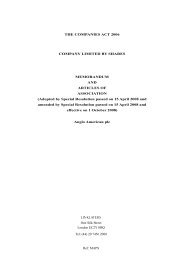
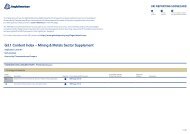

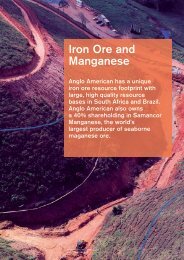
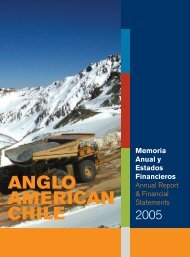
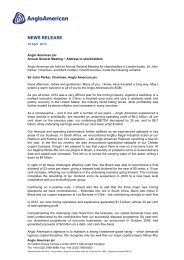
![English PDF [ 189KB ] - Anglo American](https://img.yumpu.com/50470814/1/184x260/english-pdf-189kb-anglo-american.jpg?quality=85)
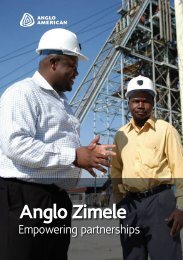

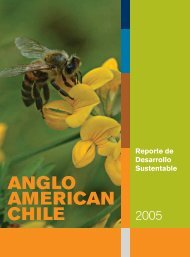
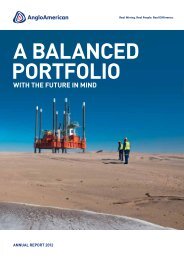
![pdf [ 595KB ] - Anglo American](https://img.yumpu.com/49420483/1/184x260/pdf-595kb-anglo-american.jpg?quality=85)
![pdf [ 1.1MB ] - Anglo American](https://img.yumpu.com/49057963/1/190x240/pdf-11mb-anglo-american.jpg?quality=85)
